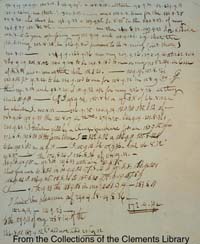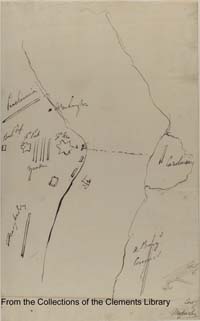Selling West Point
July 15, 1780 -- Benedict Arnold
to John André
 When Benedict Arnold wrote this letter
to John André, he was still in Philadelphia.
General
George Washington had agreed to let Arnold have command of West Point
on June 29, 1780. Arnold’s command included not only West Point but also
the area from Fishskill to King’s Ferry, the infantry and cavalry on the
east side of the river down to British lines, and the forts at Stoney Point
and Verplanck’s Point. Arnold probably did not leave Philadelphia
for West Point until after July 21. Nevertheless, in this letter
Arnold offered to surrender West Point for 20,000 pounds. Because of
delays in communication, Arnold did not know that his offer to surrender
West Point had been accepted until August 24, 1780.
When Benedict Arnold wrote this letter
to John André, he was still in Philadelphia.
General
George Washington had agreed to let Arnold have command of West Point
on June 29, 1780. Arnold’s command included not only West Point but also
the area from Fishskill to King’s Ferry, the infantry and cavalry on the
east side of the river down to British lines, and the forts at Stoney Point
and Verplanck’s Point. Arnold probably did not leave Philadelphia
for West Point until after July 21. Nevertheless, in this letter
Arnold offered to surrender West Point for 20,000 pounds. Because of
delays in communication, Arnold did not know that his offer to surrender
West Point had been accepted until August 24, 1780.
Throughout this time, Arnold’s post at West Point
was not yet guaranteed. Arnold met Washington on July 31 as Washington
was crossing the Hudson at King’s Ferry, and Washington suggested that
Arnold take command of light troops in a campaign against the British in
New York. Remember that over a month earlier, Arnold had betrayed
Washington’s movements and his plans with the French. Perhaps
in response to Arnold’s intelligence, Sir
Henry Clinton decided to stay in New York to defend that area from
a French advance as well as to prevent General Washington’s troops from
crossing the Hudson River to meet up with the French troops. The
French Comte de Rochambeau’s troops landed on July 12, 1780, and Washington
crossed the Hudson at King’s Ferry on July 31, 1780 to meet them.
A few days after Washington suggested that Arnold help him in his advance
towards Clinton’s troops, Arnold pleaded that his wounded leg prevented
him from taking the field. So Washington allowed him to take command
of West Point on August 3 instead. 
West Point was valuable because of its strategic position. West Point was poised at a sharp curve in the Hudson River. At West Point, it was possible to lay defenses in the Hudson River that would prevent any ships from navigating it. Possession of West Point would have enabled Clinton to gain control of the Hudson River and divide the colonies. Furthermore, at this point in time, if Arnold would have surrendered West Point, Washington would have had to retreat from his current position in New York, break off his plans to unite with the French to attack Clinton in New York, and leave French troops vulnerable in Long Island. Clinton then could have defeated the French.
Although Arnold had repeatedly sent Clinton letters through his intermediaries throughout July, apparently Clinton did not receive any of them. In a letter that Arnold received on July 13, 1780, Clinton had responded to Arnold, through André, but did not acknowledge any of the information that Arnold had sent previously. Clinton even asked Arnold to continue to send Clinton more regular information. In response, Arnold fired of this letter about his terms of service. In this letter, he made reference to the previous letter, to which he mistakenly referred as written on July 13 instead of on July 12, and told Clinton that he had already supplied intelligence. Arnold had previously thought that his messengers (Jonathan Odell and Joseph Stansbury) were untrustworthy and later began to use Samuel Wallis instead of Stansbury as his agent, but Clinton may not have seen his letters because he was preoccupied with capturing Charleston, South Carolina and preparing for the French to arrive in Newport, Rhode Island.
After Arnold assumed command of West Point, he
continued to correspond with André. To prepare for the surrender
of West Point, Arnold scattered his troops to weaken West Point’s
defenses. On September 19, Clinton readied his men and ships to capture
West Point as soon as André had finished the final negotiations
with Arnold. But on September 23, 1780, the Americans captured André
while he was carrying papers relating to West Point’s garrisons and defenses
and a pass from Arnold. Thus, the plan failed and Arnold’s treachery
was revealed.
Previous Story |
Next Story |
![]()
|
|
|
|
Letters | Stories | Methods | People | Routes | Timeline | Home
Clements Library | Sir Henry Clinton Collection | Teachers' Lounge | About the Project | Bibliography